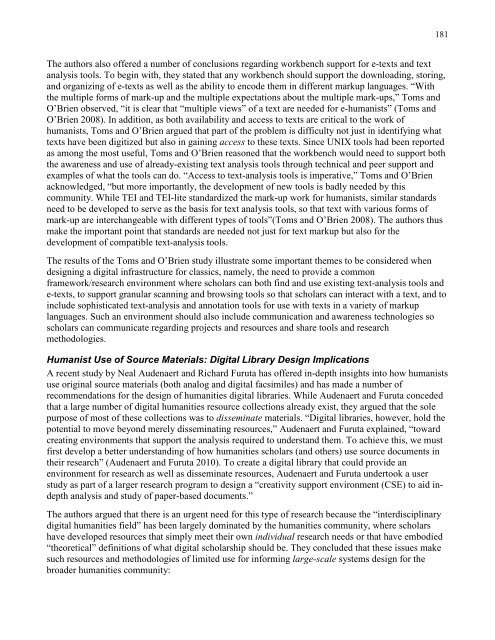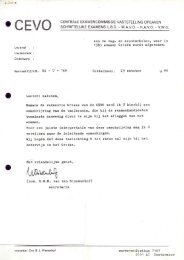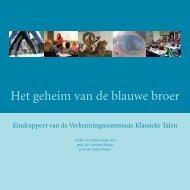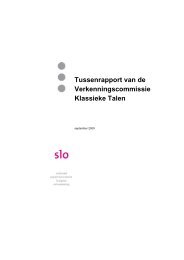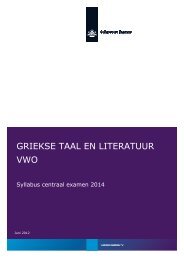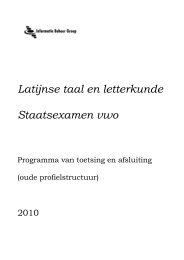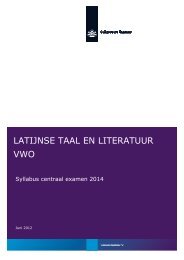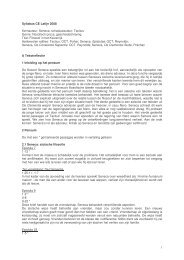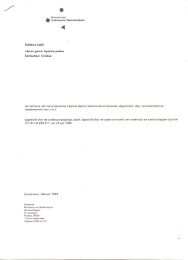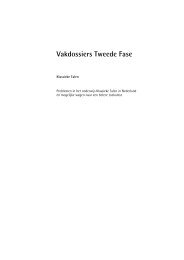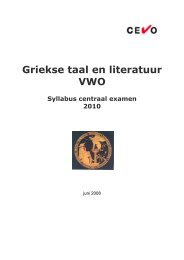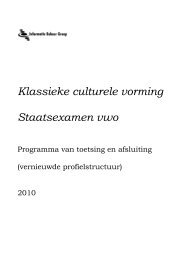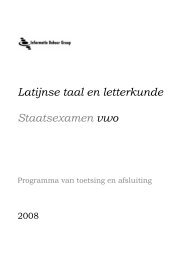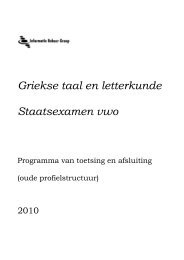Rome Wasn't Digitized in a Day - Council on Library and Information ...
Rome Wasn't Digitized in a Day - Council on Library and Information ...
Rome Wasn't Digitized in a Day - Council on Library and Information ...
You also want an ePaper? Increase the reach of your titles
YUMPU automatically turns print PDFs into web optimized ePapers that Google loves.
181<br />
The authors also offered a number of c<strong>on</strong>clusi<strong>on</strong>s regard<str<strong>on</strong>g>in</str<strong>on</strong>g>g workbench support for e-texts <strong>and</strong> text<br />
analysis tools. To beg<str<strong>on</strong>g>in</str<strong>on</strong>g> with, they stated that any workbench should support the download<str<strong>on</strong>g>in</str<strong>on</strong>g>g, stor<str<strong>on</strong>g>in</str<strong>on</strong>g>g,<br />
<strong>and</strong> organiz<str<strong>on</strong>g>in</str<strong>on</strong>g>g of e-texts as well as the ability to encode them <str<strong>on</strong>g>in</str<strong>on</strong>g> different markup languages. “With<br />
the multiple forms of mark-up <strong>and</strong> the multiple expectati<strong>on</strong>s about the multiple mark-ups,” Toms <strong>and</strong><br />
O’Brien observed, “it is clear that “multiple views” of a text are needed for e-humanists” (Toms <strong>and</strong><br />
O’Brien 2008). In additi<strong>on</strong>, as both availability <strong>and</strong> access to texts are critical to the work of<br />
humanists, Toms <strong>and</strong> O’Brien argued that part of the problem is difficulty not just <str<strong>on</strong>g>in</str<strong>on</strong>g> identify<str<strong>on</strong>g>in</str<strong>on</strong>g>g what<br />
texts have been digitized but also <str<strong>on</strong>g>in</str<strong>on</strong>g> ga<str<strong>on</strong>g>in</str<strong>on</strong>g><str<strong>on</strong>g>in</str<strong>on</strong>g>g access to these texts. S<str<strong>on</strong>g>in</str<strong>on</strong>g>ce UNIX tools had been reported<br />
as am<strong>on</strong>g the most useful, Toms <strong>and</strong> O’Brien reas<strong>on</strong>ed that the workbench would need to support both<br />
the awareness <strong>and</strong> use of already-exist<str<strong>on</strong>g>in</str<strong>on</strong>g>g text analysis tools through technical <strong>and</strong> peer support <strong>and</strong><br />
examples of what the tools can do. “Access to text-analysis tools is imperative,” Toms <strong>and</strong> O’Brien<br />
acknowledged, “but more importantly, the development of new tools is badly needed by this<br />
community. While TEI <strong>and</strong> TEI-lite st<strong>and</strong>ardized the mark-up work for humanists, similar st<strong>and</strong>ards<br />
need to be developed to serve as the basis for text analysis tools, so that text with various forms of<br />
mark-up are <str<strong>on</strong>g>in</str<strong>on</strong>g>terchangeable with different types of tools”(Toms <strong>and</strong> O’Brien 2008). The authors thus<br />
make the important po<str<strong>on</strong>g>in</str<strong>on</strong>g>t that st<strong>and</strong>ards are needed not just for text markup but also for the<br />
development of compatible text-analysis tools.<br />
The results of the Toms <strong>and</strong> O’Brien study illustrate some important themes to be c<strong>on</strong>sidered when<br />
design<str<strong>on</strong>g>in</str<strong>on</strong>g>g a digital <str<strong>on</strong>g>in</str<strong>on</strong>g>frastructure for classics, namely, the need to provide a comm<strong>on</strong><br />
framework/research envir<strong>on</strong>ment where scholars can both f<str<strong>on</strong>g>in</str<strong>on</strong>g>d <strong>and</strong> use exist<str<strong>on</strong>g>in</str<strong>on</strong>g>g text-analysis tools <strong>and</strong><br />
e-texts, to support granular scann<str<strong>on</strong>g>in</str<strong>on</strong>g>g <strong>and</strong> brows<str<strong>on</strong>g>in</str<strong>on</strong>g>g tools so that scholars can <str<strong>on</strong>g>in</str<strong>on</strong>g>teract with a text, <strong>and</strong> to<br />
<str<strong>on</strong>g>in</str<strong>on</strong>g>clude sophisticated text-analysis <strong>and</strong> annotati<strong>on</strong> tools for use with texts <str<strong>on</strong>g>in</str<strong>on</strong>g> a variety of markup<br />
languages. Such an envir<strong>on</strong>ment should also <str<strong>on</strong>g>in</str<strong>on</strong>g>clude communicati<strong>on</strong> <strong>and</strong> awareness technologies so<br />
scholars can communicate regard<str<strong>on</strong>g>in</str<strong>on</strong>g>g projects <strong>and</strong> resources <strong>and</strong> share tools <strong>and</strong> research<br />
methodologies.<br />
Humanist Use of Source Materials: Digital <strong>Library</strong> Design Implicati<strong>on</strong>s<br />
A recent study by Neal Audenaert <strong>and</strong> Richard Furuta has offered <str<strong>on</strong>g>in</str<strong>on</strong>g>-depth <str<strong>on</strong>g>in</str<strong>on</strong>g>sights <str<strong>on</strong>g>in</str<strong>on</strong>g>to how humanists<br />
use orig<str<strong>on</strong>g>in</str<strong>on</strong>g>al source materials (both analog <strong>and</strong> digital facsimiles) <strong>and</strong> has made a number of<br />
recommendati<strong>on</strong>s for the design of humanities digital libraries. While Audenaert <strong>and</strong> Furuta c<strong>on</strong>ceded<br />
that a large number of digital humanities resource collecti<strong>on</strong>s already exist, they argued that the sole<br />
purpose of most of these collecti<strong>on</strong>s was to dissem<str<strong>on</strong>g>in</str<strong>on</strong>g>ate materials. “Digital libraries, however, hold the<br />
potential to move bey<strong>on</strong>d merely dissem<str<strong>on</strong>g>in</str<strong>on</strong>g>at<str<strong>on</strong>g>in</str<strong>on</strong>g>g resources,” Audenaert <strong>and</strong> Furuta expla<str<strong>on</strong>g>in</str<strong>on</strong>g>ed, “toward<br />
creat<str<strong>on</strong>g>in</str<strong>on</strong>g>g envir<strong>on</strong>ments that support the analysis required to underst<strong>and</strong> them. To achieve this, we must<br />
first develop a better underst<strong>and</strong><str<strong>on</strong>g>in</str<strong>on</strong>g>g of how humanities scholars (<strong>and</strong> others) use source documents <str<strong>on</strong>g>in</str<strong>on</strong>g><br />
their research” (Audenaert <strong>and</strong> Furuta 2010). To create a digital library that could provide an<br />
envir<strong>on</strong>ment for research as well as dissem<str<strong>on</strong>g>in</str<strong>on</strong>g>ate resources, Audenaert <strong>and</strong> Furuta undertook a user<br />
study as part of a larger research program to design a “creativity support envir<strong>on</strong>ment (CSE) to aid <str<strong>on</strong>g>in</str<strong>on</strong>g>depth<br />
analysis <strong>and</strong> study of paper-based documents.”<br />
The authors argued that there is an urgent need for this type of research because the “<str<strong>on</strong>g>in</str<strong>on</strong>g>terdiscipl<str<strong>on</strong>g>in</str<strong>on</strong>g>ary<br />
digital humanities field” has been largely dom<str<strong>on</strong>g>in</str<strong>on</strong>g>ated by the humanities community, where scholars<br />
have developed resources that simply meet their own <str<strong>on</strong>g>in</str<strong>on</strong>g>dividual research needs or that have embodied<br />
“theoretical” def<str<strong>on</strong>g>in</str<strong>on</strong>g>iti<strong>on</strong>s of what digital scholarship should be. They c<strong>on</strong>cluded that these issues make<br />
such resources <strong>and</strong> methodologies of limited use for <str<strong>on</strong>g>in</str<strong>on</strong>g>form<str<strong>on</strong>g>in</str<strong>on</strong>g>g large-scale systems design for the<br />
broader humanities community:


